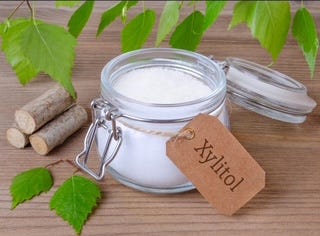….not for your pet!
When I graduated from dental school (25 years ago), I recall there being a buzz about xylitol in dentistry. It was being covered in our journals as a sugar alternative that demonstrated anticariogenic (prevents cavities) properties. Being a new grad who believed wholeheartedly that fluoride was the only true way to prevent tooth decay, I dismissed this as a 'fad' in dentistry. Fast forward a quarter century (you know my views on fluoride), xylitol has demonstrated to have positive effects that reach beyond the mouth.
History
Xylitol is a natural sweetener that is used in products like gums, candies, colas and other sweet treats. In its raw form it is a white crystalline substance that can be derived from berries, vegetables and forest products. It is used as a low-caloric substitute marketed for those watching their sugar consumption. Xylitol is metabolized without the production of insulin which makes it an alternative for patients with diabetes. But lesser known is that it also has impressive benefits for our dental and physical health.
Two German researchers isolated the compound from beech wood chips in 1890. The name is derived from the Greek word xylon, meaning wood and the suffix -itol denoting a sugar alcohol. During WWII there were major sugar shortages in parts of the world. One of those places was Finland and they creatively began using xylitol as an alternative to sugar. This was so widely accepted by the Finnish population that consumption became common even once sugar was easily available. Finland is considered the home of xylitol.
Oral Benefits
The bacteria in our mouth responsible for tooth decay is the species Streptococcus Mutans (S. Mutans). S Mutans metabolize sugars from our diet and produce tooth destroying acid. Xylitol is a non-nutritive sweetener that cannot be metabolized by S Mutans and the bacteria essentially starve. Studies demonstrate a 27-75% selective reduction of cavity causing bacteria while not contributing to the demise of known beneficial oral bacteria. This helps to reduce the formation of tooth decay and prohibit plaque formation. In some countries, xylitol gums and candies are given to students after lunch to assist in plaque and decay reduction.
For patients who suffer from the painful and annoying side effects of dry mouth, xylitol is indicated to help stimulate salivary production. This can be accomplished through chewing gums and hard candies in between meals. For faster relief oral mouth sprays are available to moisturize the tissues of the oral cavity. Xerostomia (dry mouth) is a common side effect of prescription medications and is also another frustrating element of the aging process. Most individuals do not recognize their reduced salivary production until they have lost 40% of their normal salivary flow. Because saliva plays such a crucial role in tooth remineralization, the effects of dry mouth can lead to rampant tooth decay and irritating mouth sores.
Here, here and here are links to different xylitol mints, gums and a dry mouth moisturizer that I have tried and enjoyed. For patients attempting to mitigate tooth decay, chewing a piece or two of xylitol gum or mints after eating is recommended. For patients with dry mouth, the gums and mints can be used to help stimulate salivary production. The dry mouth moisturizer can be utilized during the day or at night when you awaken annoyed by the desert in your mouth. This product is a xylitol based product indicated for longer relief during sleeping hours.
Digestive Benefits
Xylitol is not broken down by stomach acids which slows gastric emptying and helps with feelings of satiety. As it moves into our intestines the unabsorbed xylitol behaves like a dietary fiber. Beneficial bacteria ferment xylitol into volatile short chain fatty acids. For some individuals, there may be an initial period of gas and bloating experienced from xylitol consumption. This stabilizes as your body normalizes to daily consumption.
On a daily basis our bodies produce about 15mg of xylitol naturally through essential metabolic pathways. Because xylitol contains no fructose it has negligible effects on blood sugar and insulin. In animal models, xylitol has demonstrated a reduction in belly fat and improved symptoms of diabetes.
Nasal Benefits
Like the oral cavity, the nose is a primary entry point for pathogens that can make us sick. Our noses have a special job of humidifying and cleansing the air we breathe in a way that mouth breathing cannot achieve. During the winter months when the air is dryer, the lack of humidity can lead to decreased functioning of the cilia (think cleaning tools of our nose). In a properly hydrated environment the cilia work to clean pathogens from the air we breathe preventing them from being able to enter into the lower respiratory tract.
One way to mitigate the dryness that occurs during our winter months indoors is using a saline nasal irrigation. This helps to clean and moisturize the soft tissue lining of our noses. During cold and Flu season, xylitol can help to reduce the ability for certain bacteria and viruses to attach and infect. Research has demonstrated the addition of xylitol added to saline irrigation can help to improve symptoms of chronic sinusitis better than saline alone. This can help patients who suffer these symptoms to breathe more easily both day and night. Unlike some nasal treatments, xylitol/saline sprays are non-habit forming and appear to bypass microbial resistance pathways.
Being able to breathe comfortably through your nose is imperative to optimal health. We spend much time daily washing our hands and cleaning our teeth but little regard for one of our hardest working body parts....our noses. One product that I have tried and have enjoyed the results is a nasal spray called Xlear.
Bone Health
I plan to write a separate email addressing the most commonly asked prescription question I receive regarding bone density drugs known as osteoclast inhibitors. For now, I will mention that research demonstrates the prebiotic effects of xylitol in our colon helps with the solubility and absorption of calcium from our diets. Animal models have shown xylitol metabolism to assist in stimulating bone formation.
Xylitol in the News
Xylitol received some recent bad press due to a study correlating blood clots and circulating xylitol levels. When this study hit the mainstream press, it sent a wave of fear that items sweetened with xylitol would increase the consumer's risk of cardiovascular disease. Unfortunately this is a classic example of correlation does not mean causation. Dr. Peter Attia does a wonderful job in this article breaking down the limitations of this study and why the casual consumption in gums, candies, etc is not a cause for alarm.
As mentioned previously, we naturally produce xylitol as part of the glucuronate pathway. The study established that exogenous (dietary xylitol) clears blood level 4-6 hours after consumption. In the patients that were evaluated for a major adverse cardiac event (MACE), they utilized fasting blood levels of xylitol (endogenous levels). Patients at risk for a major cardiac event are often victims of metabolic dysfunction. Since, the researchers did not account for dietary xylitol consumption and only measured endogenous levels, the results are purely correlation and likely reflect the pro-inflammatory condition of the patients at highest risk.
My sweet dog at the beach with us this past fall.
Warnings
Xylitol is POISONOUS TO DOGS!! Please keep these products away from our furry canine friends.







Thank you Jessica, for such a comprehensive explanation of how, what, why, when! Appreciate your eloquence and clarity and not blinding us with a whole clinical study full of references only an academic would read!
I will share this with family members who will enjoy this information.
One of the silver linings of the COVID scamdemic was that it brought the benefits of xylitol to public prominence! I used to suffer from air barotrauma (failure to equalise pressure in my ears) every time I took a plane flight. For 2-3 days after every flight, I'd be walking around feeling disoriented, and not able to hear properly. I now use Xlear before take-off and landing, and my ears equalise pressure perfectly. I've also found that Xlear helps to prevent those annoying upper respiratory tract infections that tend to happen after flying, particularly long flights.
Now to incorporate xylitol chewing gum into my daily routine!